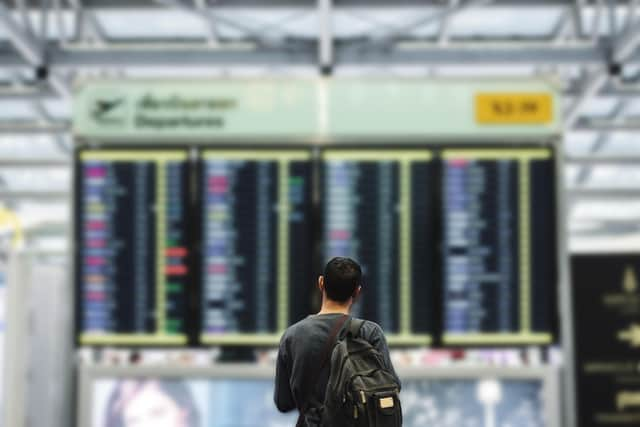Delayed and cancelled flights at Leeds Bradford Airport, Doncaster Sheffield Airport and Manchester Airport
Holidaymakers faced mass cancellations and delays in April, which saw flight punctuality fall to its lowest levels so far this year at the vast majority of large UK airports, analysis of data from the Civil Aviation Authority shows.
According to the latest data, more than 40 per cent of flights from DSA in April were delayed, which equates to more than 200.
Advertisement
Hide AdAdvertisement
Hide AdAt Leeds Bradford Airport, more than 28 per cent of flights were delayed, meaning more than 500 flights took off late.


And at nearby Manchester Airport, 40 per cent of flights were also delayed, but that accounts to almost 5,000 flights.
At the smaller Teesside International Airport, 22 per cent of flights took off late, but that only meant 843 flights were delayed.
All figures include both arrivals and departures and both scheduled and chartered (e.g. package holiday company) flights.
Advertisement
Hide AdAdvertisement
Hide AdSouthampton Airport fared worst for cancellations in April, with four per cent of flights called off.
Only flights cancelled at short notice are counted in the statistics. Cancelled flights are defined as those which are called off within 24 hours of the scheduled departure time.
Looking at delays as well as cancellations, Birmingham Airport fared the worst, with only 59 per cent of flights arriving and departing on time in April.
This was followed by Manchester Airport, with a punctuality rate of 59 per cent, and Doncaster Sheffield Airport, at 60 per cent.
Advertisement
Hide AdAdvertisement
Hide AdThe statistics show there were no flights cancelled from DSA or Teesside, just five from LBA and 118 from Manchester, equating for less than one per cent of flights.
East Midlands International Airport had the best punctuality record, with 84 per cent of flights arriving or leaving on schedule, followed by Exeter at 81 per cent and London City at 78 per cent.
Officials count a flight as delayed if it is more than 15 minutes late.
Many people have been keen to return to taking trips abroad after years of lockdowns and restrictions, but the number of travellers remained well below pre-pandemic levels that month, the figures show.
Advertisement
Hide AdAdvertisement
Hide AdAviation experts say it is a lack of trained and vetted staff, both within airports and on airlines, that is at the root of the problems.
On Tuesday (June 21), the Government set out plans which aim to prevent last-minute flight cancellations during the summer peak.
The regulations will allow a one-off ‘amnesty’ on airport slots rules, allowing airlines to deliver a more realistic summer schedule based on their staffing levels. The Department for Transport said this was being provided as an exceptional measure while the aviation industry recruits the necessary workers.
Flight slots are used to manage capacity at the busiest airports, giving an airline permission to use the runway, terminal and gates at an airport on a specific date and time.
Advertisement
Hide AdAdvertisement
Hide AdAirlines must use slots a certain amount of times each season in order to keep them. However, many parts of the sector have been unable to recruit enough staff in time to fly the number of flights they have planned for, leading to flights being cancelled at short notice.
Subject to approval by Parliament, the Government will now give airlines a short window to temporarily hand back slots for the rest of the summer season that they are not confident they will be able to operate. Ministers said this would help passengers find alternative arrangements ahead of time, rather than face the kind of last-minute cancellations seen over the Easter and half-term holidays.
Aviation Minister Robert Courts said: “This is a hugely challenging time for our recovering aviation industry, but we cannot have a situation where passengers arrive at the airport just to have their flight cancelled or face long delays.”
Richard Moriarty, Chief Executive of the Civil Aviation Authority, said: “Providing passengers with certainty this summer is vital and this intervention will help to relieve the pressures we see being experienced by the aviation industry and its customers. Short-term measures are welcomed, but a continued focus on the unplanned and inevitable operational challenges is crucial for consumer confidence this summer.”
Advertisement
Hide AdAdvertisement
Hide AdTim Alderslade, CEO of Airlines UK, said: “This is a welcome step that will help build greater resilience into operations this summer, coming on top of measures already taken by the sector. We will continue to work with ministers and the whole aviation ecosystem to ensure the summer peak runs as smoothly as possible for our passengers.”

